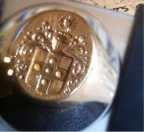Finishing Dante
On June 8, 2007 I started reading Dante's Comedia with a group of 7 people. There are 100 cantos in the 3 cantiche. We will finish 99 & 100 in the next 2 weeks. Of the 7 who started 6 remain, I dropped out and we picked up another on the way. Anticipatory congratulations to my fellow pilgrims. It has been a privilege. Over this time I accumulated the following in my work space:
• 5 unique translations of the comedia
• 1 stand alone inferno
• 4 volumes of illustrations
• 7 volumes of commentary, criticism
• 12 volumes of related texts/commentaries/classics cited in or relevant to the work
• 2 latin dictionaries
• 3 italian dictionaries
• 2 dictionaries of symbols
• 1 dictionary of philosophy
• 1 etymological dictionary
• 1 oxford classical dictionary
• 1 bible
• several hundred pages of notes
• 1 cd of the comedia in the Italian
• 1 cd of an English translation of the comedia
• 1 stand alone inferno
• 4 volumes of illustrations
• 7 volumes of commentary, criticism
• 12 volumes of related texts/commentaries/classics cited in or relevant to the work
• 2 latin dictionaries
• 3 italian dictionaries
• 2 dictionaries of symbols
• 1 dictionary of philosophy
• 1 etymological dictionary
• 1 oxford classical dictionary
• 1 bible
• several hundred pages of notes
• 1 cd of the comedia in the Italian
• 1 cd of an English translation of the comedia
The depth of understanding human nature expressed in the comedia is mind boggling. I would not have approached anything close to a satisfying and reasoned reading of the work without the help of my reading group partners. This was exciting and hard work. What a construction project!
Dante's 14th Century Florence was as full of the political intrigue, schismatics, corrupt clergy, criminals, autocrats, and bonhommes as our 21st Century. From Inferno through Paradiso are the personality types that populate our culture as well. In so doing Dante has laid before us the full range of humanity for observation, contemplation and recognition.
The contrapasso is his appropriate means of addressing the causes and effects of a life lived. In many respects I consider Dante among the greatest of urban planners - a place for everyone and everyone in their place.
TS Eliot, born in St. Louis and considered by many to be the greatest poet of the 20th Century, virtually quoted passages from Dante in his The Wasteland of 1922. Eliot was interested in examining life lived below potential, so the stasis found in most of the comedia is relevant to his work.
The questions raised by these seminal works are the ones we need to ask ourselves....
The questions raised by these seminal works are the ones we need to ask ourselves....



<< Home